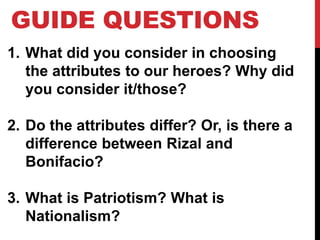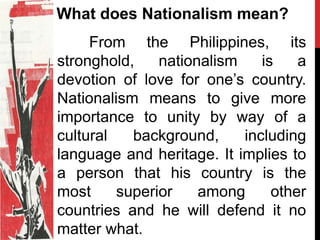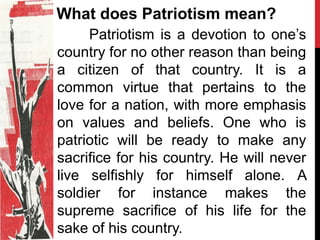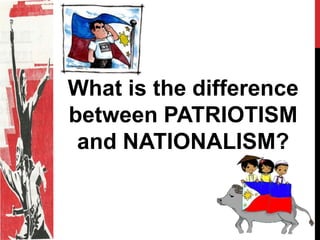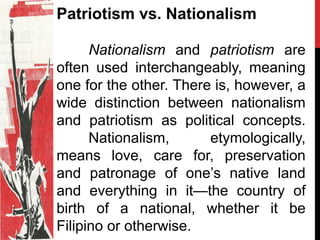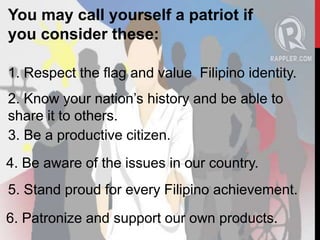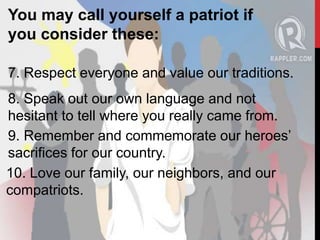Patriotism and nationalism
- 2. ¡°They¡± say, Filipinos talk a lot. So, let¡¯s talk about this. Based from your experience and judgment¡ Try this! Who among them was the Patriot? Who was the Nationalist? Note: You may answer that both of them may be both, BUT, just pick one attribute to each. Then explain.
- 3. GUIDE QUESTIONS 1. What did you consider in choosing the attributes to our heroes? Why did you consider it/those? 2. Do the attributes differ? Or, is there a difference between Rizal and Bonifacio? 3. What is Patriotism? What is Nationalism?
- 4. How? Do you consider yourself a patriot or a nationalist?
- 5. Do you know the symbol of your country and explain every part that makes it? Do you know the lyrics of your National Anthem? What is the History of your country? Who were the loyal generals of President Emilio Aguinaldo? Can you name the presidents of Philippines from Aguinaldo to Aquino?
- 6. Why do malls play the ¡°Lupang Hinirang¡± in their movie theaters? In a formal program, why does national anthem come first before the prayer? What does it take to be a Filipino? To be a truly Filipino citizen?
- 7. What does Nationalism mean? From the Philippines, its stronghold, nationalism is a devotion of love for one¡¯s country. Nationalism means to give more importance to unity by way of a cultural background, including language and heritage. It implies to a person that his country is the most superior among other countries and he will defend it no matter what.
- 8. What does Patriotism mean? Patriotism is a devotion to one¡¯s country for no other reason than being a citizen of that country. It is a common virtue that pertains to the love for a nation, with more emphasis on values and beliefs. One who is patriotic will be ready to make any sacrifice for his country. He will never live selfishly for himself alone. A soldier for instance makes the supreme sacrifice of his life for the sake of his country.
- 9. What is the difference between PATRIOTISM and NATIONALISM?
- 10. Patriotism vs. Nationalism Nationalism and patriotism are often used interchangeably, meaning one for the other. There is, however, a wide distinction between nationalism and patriotism as political concepts. Nationalism, etymologically, means love, care for, preservation and patronage of one¡¯s native land and everything in it¡ªthe country of birth of a national, whether it be Filipino or otherwise.
- 11. To be a Filipino nationalist, therefore, the ethnological ramifications of nationalism must all be present in one¡¯s being. This implies a heartfelt dedication for the love, care, and preservation of the Philippines and everything that is identified with it: the Philippine territory, the inhabitants, Philippine sovereignty, its government, all things that represent and symbolize the country; the aspirations, hopes, dreams and needs of the Filipino people.
- 12. On the other hand, patriotism is taken from the Latin term pater, which literally means ¡°father¡±. Patriotism is the willingness and determination to lay down one¡¯s life for the fatherland¡ªthe constant resolve to sacrifice one¡¯s life and limb for the preservation of the State. It is the total realization of that love for the country, which is nationalism. In other words, to be patriotic is to be nationalistic. Conversely, one cannot be patriotic without being nationalistic.
- 13. Patriotism vs. Nationalism The famous poet Rabindranath Tagore, himself a great patriot, said that patriotism is more important than nationalism. A patriot loves his own country, but he does not hate the people of other countries. A nationalist might consider his own nation important and hate the people of other nations. A patriot is international in his outlook. He is broad-minded and tolerant. He is a citizen of the world. A nationalist may be narrow-minded. He may think in terms of his own country and hate all those who are not his countrymen.
- 15. You may call yourself a patriot if you consider these: 1. Respect the flag and value Filipino identity. 2. Know your nation¡¯s history and be able to share it to others. 3. Be a productive citizen. 4. Be aware of the issues in our country. 5. Stand proud for every Filipino achievement. 6. Patronize and support our own products.
- 16. You may call yourself a patriot if you consider these: 7. Respect everyone and value our traditions. 8. Speak out our own language and not hesitant to tell where you really came from. 9. Remember and commemorate our heroes¡¯ sacrifices for our country. 10. Love our family, our neighbors, and our compatriots.
- 17. Application 1: ¡°Share Your Views¡± ¡°Filipino is worth dying for¡±. A patriotic line from Ninoy Aquino, Jr. whose ideals motivated the Filipinos to end the autocratic leadership of Pres. Marcos. Almost four decades have passed, so many changes have led us into different ways. Can you still say that Filipino is worth dying for?
- 19. Application 2: ¡°View your ideas!¡± There are so many ways that obstruct Filipinos to become patriots. What are the aspects/factors that hinder us to do so? Group! Enumerate! Explain! Present! Reflect! Creatively present your ideas after 20 minutes.
- 20. Fact! In the Philippines, today, we are lacking in patriots largely due to the diffusion of Filipino values, culture, influence of conquistadores, and the confluence of historical bad governance. The Philippine State is in dire need of statesmen who truly understand the basics of politics¡ªpolitics being defined as the systematic study of the state¡
- 21. -the state being defined as having four basic elements: territory (the Philippine archipelago, its waters, subterranean shelves, etc.), people (the Filipino people who are nationalistic and patriotic), sovereignty (freedom from foreign dictates), and government (a body politic composed of delegates who are considered to be representatives of the people to stand and fight for Filipino interests, dreams, aspirations, and hopes).
- 22. For as long as our political leaders blind us of these things, for as long as the Filipino people refuse to learn, for as long as we remain mediocre, for as long we could not change our self inwardly, for as long as we refuse to change, nationalism and patriotism will only be words in the dictionary. Remember!


